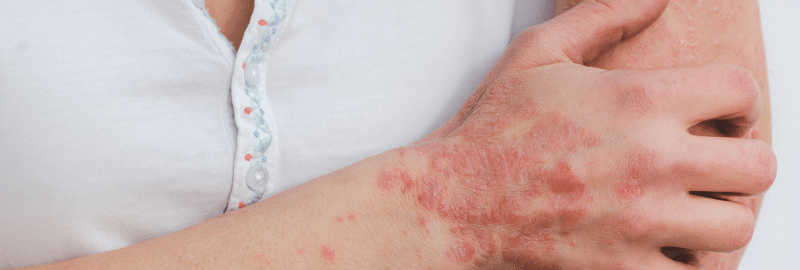Florida may be known for its year-round sunny weather, but seasonal changes can still impact Floridians, especially those with allergies or skin conditions like psoriasis. Understanding how seasonal changes affect your skin can help you manage your symptoms as fall gets underway.
Your trusted experts at ADF dermatology in Sarasota and Port Charlotte are here to help you find relief for psoriasis all year long.
Weather Triggers for a Psoriasis Flare-Up
As fall weather settles in, changes in temperature and humidity can significantly affect your skin and trigger psoriasis flare-ups. Here are some ways the changing weather in fall can affect your skin:
- Dryer Air: As temperatures drop, the air loses humidity, which can strip moisture from your skin, leading to dryness and flaking.
- Indoor Heating: Turning on the heat indoors can create a dry environment that aggravates sensitive skin and worsens conditions like psoriasis or eczema.
- Cold Winds: Exposure to chilly winds can irritate the skin, causing redness, chapping, and increased sensitivity.
- Reduced Sunlight: With fewer daylight hours, less exposure to natural sunlight can impact skin conditions like psoriasis, which may benefit from UV light.
- Hot Showers: As the weather cools, taking longer, hotter showers might feel comforting, but they can further dry out the skin and exacerbate existing issues.
Being proactive about skin care can help mitigate these effects and keep your skin healthy through the season.
Managing Psoriasis Symptoms in the Fall
Managing psoriasis symptoms during the fall requires some extra attention, as the changing weather can exacerbate skin dryness and irritation. To help keep your symptoms in check and maintain healthy skin:
- Moisturize Regularly: Apply a thick, fragrance-free moisturizer immediately after bathing and throughout the day to lock in moisture and prevent dryness. Ointments and creams may be more effective than lotions for psoriasis-prone skin.
- Use a Humidifier: Adding moisture to the air at home can counteract the drying effects of indoor heating and help keep your skin hydrated.
- Avoid Long, Hot Showers: While hot showers may feel soothing, they can strip your skin of natural oils. Instead, opt for lukewarm water and limit your showers to 10 minutes or less.
- Wear Layers: Cold winds and dry air can irritate your skin, so dress in layers to protect it from harsh weather. Choose soft, breathable fabrics like cotton to minimize irritation.
- Maintain Your Treatment Routine: Don’t skip any prescribed treatments, even if your symptoms seem to improve. Consistency is key to keeping flare-ups under control.
- Stay Hydrated: Drinking plenty of water helps keep your skin moisturized from the inside out, so make sure you’re getting enough fluids daily.
If you notice a significant increase in symptoms or if your usual management strategies aren’t as effective, it’s important to consult a dermatologist. Dr. Fernandez and our experts at ADF Dermatology are here to help you find the best solutions for your skin’s needs. Our personalized approach to patient care includes recommendations and treatments to keep your psoriasis symptoms under control during the fall and beyond.
Schedule your Fall skin exam today to make sure your psoriasis or other skin concerns are well-managed no matter what the weather.




